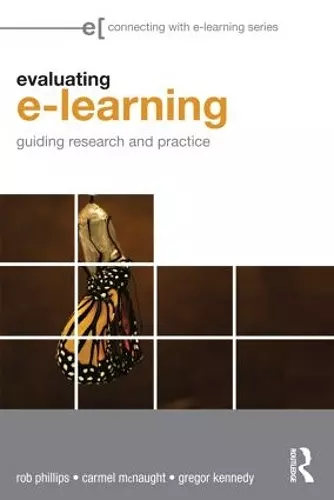Evaluating e-Learning
Guiding Research and Practice
Rob Phillips author Carmel McNaught author Gregor Kennedy author
Format:Paperback
Publisher:Taylor & Francis Ltd
Published:20th Jul '11
Currently unavailable, and unfortunately no date known when it will be back
This paperback is available in another edition too:
- Hardback£160.00(9780415881937)

How can novice e-learning researchers and postgraduate learners develop rigorous plans to study the effectiveness of technology-enhanced learning environments? How can practitioners gather and portray evidence of the impact of e-learning? How can the average educator who teaches online, without experience in evaluating emerging technologies, build on what is successful and modify what is not?
By unpacking the e-learning lifecycle and focusing on learning, not technology, Evaluating e-Learning attempts to resolve some of the complexity inherent in evaluating the effectiveness of e-learning. The book presents practical advice in the form of an evaluation framework and a scaffolded approach to an e-learning research study, using divide-and-conquer techniques to reduce complexity in both design and delivery. It adapts and builds on familiar research methodology to offer a robust and accessible approach that can ensure effective evaluation of a wide range of innovative initiatives, including those covered in other books in the Connecting with e-Learning series.
Readers will find this jargon-free guide is a must-have resource that provides the proper tools for evaluating e-learning practices with ease.
"Education scholars Phillips, Carmel McNaught , and Gregor Kennedy offer a step-by-step guide to designing and conducting a study evaluating electronic learning, particularly addressing acknowledged weaknesses in the quality of research so far. They intend the book to be used by practitioners and researchers in formal and informal settings."--Reference and Research Book News
Julie-Ann Sime Lancaster University (Areas of speciality: E-learning, evaluation, research methods)
I would recommend this book to my distance learning, doctoral students in e-Research and Technology Enhanced Learning, as it provides a good source of evaluation methods, models and frameworks as well as presenting international examples of practice.
This book is particularly appealing because it is not based on a single approach to evaluation of e-learning but gives an overview of a range of methods appropriate for a variety of situations from an educator wanting to improve practice in small ways to evaluation of development projects. It adopts a pragmatic approach and is illustrated by case studies including mixed methods approaches that adopt 3 different perspectives on evaluation. This multi-perspective approach is particularly distinctive and appealing.
Alejandro Armellini, University of Leicester (Areas of specialty:Peadagogy in online learning environments, learning technologies)
It certain would sell copies overseas, especially given the origins of the authors and likely endorsements.
I would steer clear of topics on which hundreds of books have already been written (eg the typical research methods stuff, such as instruments, validity, triangulation, paradigms…) instead, I’d focus on the specifics of evaluating e-learning – what makes e-learning evaluation different from other forms of educational research?
ISBN: 9780415881944
Dimensions: unknown
Weight: 440g
236 pages